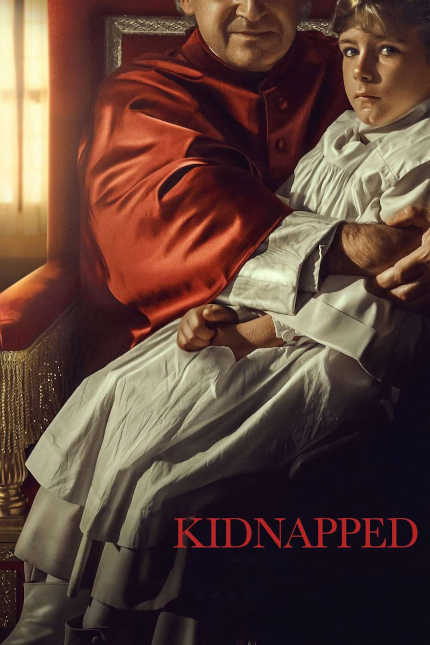Cannes 2023 Review: KIDNAPPED, Vatican Scandal Grippingly Dramatized
Director Marco Bellocchio tells a historical drama about a boy forcibly taken from his Jewish family and raised as a Catholic.

The kidnapping of Edgardo Mortara, a 6-year-old Jewish child, by Pope Pius IX and the Catholic Church was an extraordinary historical event that occurred in 1850s Italy and was much discussed throughout contemporaneous Europe.
What its impact was on those tumultuous times is uncertain, though two schools of thought have emerged. The first states that it is a historical footnote that excited much commentary but ultimately did not have major socio-political ramifications.
The second is that it irreparably damaged the reputation of the Catholic Church and led to the dissolution of the Papal States, the precursor to the modern-day Vatican City, during the upheaval that brought about the reunification of Italy in 1870. Italian auteur Marco Bellocchio presents the latter view in his fine adaptation of the story, Kidnapped, which premiered in Competition at the 2023 Cannes Film Festival.
This is a film, notably, that Steven Spielberg strove to make for years. Not this exact iteration, but this same story. You can see why. It has the theme of anti-Semitism, which Spielberg has explored in, among others, Schindler’s List and The Fabelmans. It was to be Spielberg’s next film after 2015’s Bridge of Spies. It was to be shot in early 2017 and released in time for awards consideration.
The project had tremendous pedigree. Tony Kushner had written a screenplay based on David Kertzer’s non-fiction book. Mark Rylance was set to star as Pope Pius IX and Oscar Isaac as the grown-up Edgardo Mortara. Construction of the sets was begun, but Spielberg ultimately scrapped the film and went on to make and release The Post that year.
The reason? He was unable to cast the young 6-year-old Jewish Italian boy who would lead most of the movie. Does Bellocchio succeed where Spielberg failed? Partially. Enea Sala as the 6-year-old Edgardo is suitably angelic and cherubic, though he is noticeably stiff and it is very obvious through the rest of the film that Bellocchio filmed around him as much as possible. Such are the perils of having a 6-year-old child, however talented, lead your production.
The kidnapping of Edgardo Mortara was predicated on the fact that a Catholic maid employed by the Mortara family claimed that she had given the infant Edgardo an emergency baptism because it looked like he was very ill and might not survive. The Catholic Church, when it learned of this incident, couldn’t let a Christian boy be raised as a Jew. Thus, in plain sight of the family, they took him away.
Bellocchio stages this key scene with a wrenching ferocity. After the kidnapping, Bellocchio then portrays the lengths to which the family goes to try and get their child back. In a parallel thread, we see Edgardo enrolled by the Pope in a class with Catholic boys and receiving a Christian education. The scenes of his mother and father visiting him and breaking down are stirring.
The story expands ever outwards as Jewish groups start petitioning the Pope and other powerful people to release Edgardo back to his family. There are reverse kidnapping attempts by Jewish groups to kidnap Edgardo back from the Catholics and return him to the Mortara family.
And in a notable section, Father Pier Feletti is arrested and tried in court for the kidnapping, because while the Pope had issued the order, he had carried it out. Bellocchio cannily keeps advancing in time showing us cataclysmic events in Italian history, giving life to the theory that the kidnapping was the initial domino that set up the destruction of the Papal States as they existed back then.
If Kidnapped is ultimately anticlimactic, despite all the color and detail Bellocchio seeks to add, it is a shortcoming it inherits from history because the historical tale is anti-climactic too. In this regard, the famous Dreyfus Affair in France in the 1890s can be thought of as a comparator and Roman Polanski’s An Officer and a Spy as an antecedent. The two scandals sparked awareness about grave injustices, though there were no tidy conclusions, narrative or themtic, to be had in either case.
Bellocchio is an old hand and directs the tale with confidence, though one senses the story is being presented at a much lower budget than it should have. When the Papal States are overthrown by revolution in the streets, there is a dramatic push-in towards a balcony and then a pan downwards towards the square. One expects to see 5,000 people protesting given the sound; color us disappointed that there are 30 flag-waving people running about.
The Breach of Porta Pia, the military attack where a hole was blown through the surrounding wall of Rome leading to its capture, is depicted with 12 soldiers charging through. The opportunities of creating epic scenes of upheaval are there and we might have gotten them in Spielberg’s version, but whatever Bellocchio lacks in budget, he makes up for with passion and spirit. This is still a worthwhile version of an important story that audiences could learn something from.
Kidnapped premiered at the 2023 Cannes Film Festival.

Do you feel this content is inappropriate or infringes upon your rights? Click here to report it, or see our DMCA policy.






